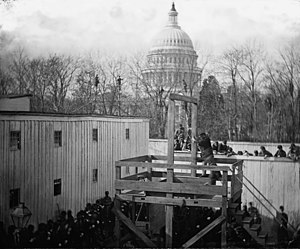Henry Wirz

Captain Henry Wirz (November 1822 – November 10, 1865) was the only Confederate soldier executed in the aftermath of the American Civil War for war crimes.
Wirz was born in Zurich, Switzerland, and immigrated to the United States in the late 1840s. He worked throughout New England as a self-taught water-cure specialist. After a short stint in Kentucky, he finally settled In Louisiana.
Civil War
When the American Civil War erupted in 1861, Wirz enlisted in the Confederate States Army as a private in the 4th Louisiana Infantry. He served on detached duty as a prison guard in Alabama before being transferred to help guard Federal prisoners incarcerated at Richmond, Virginia. During the Seven Days Battles, he was wounded at the Battle of Seven Pines, losing the use of his right arm. Rapidly promoted to captain, he continued to work in prison administration.
In February of 1864, the Confederate government established a large military prison, Camp Sumter, near the small railroad depot of Andersonville, Georgia, to house Union prisoners. Though wooden barracks were originally planned, the Confederates incarcerated the prisoners in a vast, rectangular, open-air stockade originally encompassing 16.5 acres. Wirz officially commanded the stockade interior proper. The prison was characterized by a lack of trained and adaquately equipped prison guards; a gross lack of food, tools, and medical supplies; severe overcrowding; poor sanitary conditions; and a lack of potable water. At its peak in August 1864—when Camp Sumter held approximately 32,000 Union prisoners of war—the monthly mortality rate from disease and malnutrition reached a terrible toll of 3,000 men. During its fourteen-months in existence, Camp Sumter incarcerated a grand total of 45,000 Federal prisoners—of whom 13,000 (or 28%) died.
Trial and execution
After the end of hostilities, Wirz was arrested by a contingent of federal cavalry and taken by rail to Washington, D.C. The federal government intended to place Wirz on trial for conspiring to deliberately impair the lives of Union prisoners of war.
In July 1865, the trial convened in the Old U.S. Capitol Building (now the site of the U.S. Supreme Court). The U.S. Army commission that tried Wirz relied on contemporary military law. The sensational trial lasted two months and dominated newspaper front pages across the country. The court heard the testimony of former inmates, ex-Confederate officers, and even nearby residents of Andersonville. Finally, in early November, the commission announced its verdict: Wirz was found guilty of trying to deliberately impair the lives of the prisoners.
In addition, Wirz was also found guilty of eleven of thirteen counts of individual acts of murder.
Sentenced to death, Wirz made a heartfelt plea to Lincoln's successor, President Andrew Johnson, for mercy, but the captain's letter went unanswered. Mounting the scaffold on the morning of November 10, 1865, Wirz asserted that he was being hanged for following orders. Wirz was executed on the very site where the Lincoln conspirators met their own fate just several months before—all within clear sight of the newly built U.S. Capitol dome. Wirz was eventually buried in Mt. Olivet Cemetery. He was survived by his wife and one daughter.
The Wirz trial was legally significant for two reasons. First, Wirz was the only man tried and executed for war crimes during the Civil War. Second—and more significantly—the Wirz trial was the first war crimes trial in modern history. It served as a direct, historical precedent for the Nuremberg War Crimes Tribunal after World War II.
Popular culture
The trial of Wirz was depicted in the 1970 film, The Andersonville Trial. The cast included Richard Basehart as Wirz and William Shatner as chief government prosecutor Lieutenant Colonel N.P. Chipman.
References
- Harper, Frank, Andersonville: The Trial of Captain Henry Wirz, MA Thesis, University of Northern Colorado, 1986.
Futch, Ovid, History of Andersonville Prison (Gainesville: University of Florida Press, 1968)
